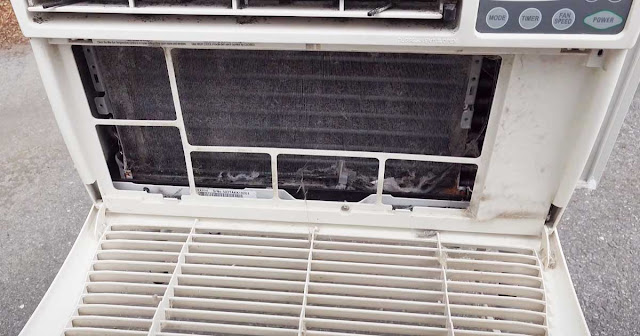Window air conditioners can accumulate a lot of dust, dirt, and grime over the years. In fact, according to a study from The Cleaning Institute, one in five people doesn't bother to clean their window unit even once a year. Therefore, every homeowner should think that their window AC units can get dirty for an extended period and require regular cleaning to keep them running efficiently.
Best Way to Clean a Window AC Unit
One of
the main reasons people don't clean their window air conditioners is that they
think it's too complicated. However, cleaning an air conditioning unit is easy
if you have the right tools and know what to do. Here are the five steps to
cleaning your window AC unit:
- Turn off the power to the AC unit and remove the grilles on both sides of the unit.
- Using a vacuum cleaner, remove all dust mites from the inside of the unit.
- Remove dust and dirt from the grilles using a mild detergent and water solution.
- Wash the filters and housing in mild soap and water.
- Rinse and dry the unit properly.
How often you should clean a window AC unit
Window AC units can become dirty
over time, impacting their performance. Therefore, cleaning your window AC unit
at least once a month is essential to maintain optimal operation. Here are some
tips for cleaning your window AC unit:
- Use a hose attachment vacuum cleaner to clean the unit's dust and debris buildup. Be sure to use the attachments specifically designed for this type of cleaning.
- Use a wet cloth to clean the exterior surfaces of the unit. Wipe down all sides and around the vents.
- Pour a pot of white vinegar into a small bowl and add enough water to fill it halfway. Wet one end of the cloth with vinegar/water mixture and wring out the excess liquid before using it to wipe down the unit's interior surfaces.
- Vacuum the inside of the unit. The air conditioner works very hard to cool down your home; therefore, it has to work harder to get rid of dirt and debris than standard window units. To keep your air conditioner running smoothly, you should remove the filters once a month and clean them with a vacuum cleaner.
- Clean the grills. The grills are the part of the unit that cools by blowing out warm air. To clean the grills, use a cloth with a bit of vinegar.
- Clean the coils. If you notice that your air conditioner is not as cool as usual, check out your coils. Clean them once a month using an all-purpose cleaner and blow dryer.
- Clean out the filters or Change your air filter. Air filters are essential to a good air conditioner, but they tend to get dirty and should be changed or cleaned regularly.
- Check the fan belt. A fan belt moves the air out of the unit and over the coils.
What materials do you need for cleaning a window AC unit?
Window
AC units require a specialized cleaning solution and rag to clean them
properly. Many people use a can of compressed air to clean their window AC
units, but this is not recommended because it can damage the unit. Instead, a
vacuum cleaner with a hose attachment is the best way to clean an AC unit. Then
use the vacuum cleaner to remove any dirt, dust, or debris from the unit's
filter and housing.
Dust
masks while cleaning the unit will help avoid inhaling any particles. For
safety, be sure to turn off the AC unit before using a vacuum cleaner and take
extra precautions when using compressed air.
What are the benefits of cleaning a window AC unit?
- Window
AC units can be cleaned regularly to maintain a clean and efficient unit. In
addition, it helps remove any buildup of dust, pollen, and other allergens
which can cause allergies.
- Dust
and other allergens can also be released from the filter when vacuumed.
Cleaning your window AC unit on a 2-3 month basis will reduce the chance of
experiencing allergies or asthma symptoms. In addition, it will help to remove
any buildup of bacteria that may have developed over time.
- Cleaning
an AC unit can help improve the airflow and performance of the unit.
- Cleaning
an AC unit regularly will help to keep it running smoothly and prevent any
buildup of dirt, dust, and debris. Additionally, by periodically cleaning the
AC unit, you will be able to keep it in good working condition.
Is it okay to use a window AC unit without cleaning?
Window AC units expel warm air and indoor pollutants through the window. For this reason, it is important to clean the filters on a WAC regularly to maintain good indoor air quality. Failure to clean the filters can allow pollutants such as pollen, bacteria, and viruses to build up and cause health problems. Therefore, it is important to clean the filters regularly to avoid potential health risks.


This blog provides excellent information about AC Service in Davie, FL. Excessive heat in summer can indeed lead to AC repairs.
ReplyDelete